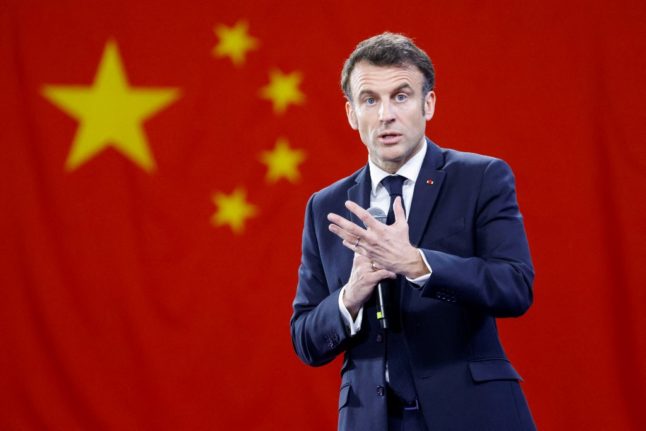His comments risk riling Washington and highlight divisions in the European Union over how to approach China, as the US steps up confrontation with its closest rival and Beijing draws closer to Russia in the wake of its invasion of Ukraine.
“The worst thing would be to think that we Europeans must be followers and adapt ourselves to the American rhythm and a Chinese overreaction,” Macron told media including French business daily Les Echos and Politico as he returned Friday from a three-day state visit to Beijing.
Citing his prized ideal of EU “strategic autonomy”, the French leader said that “we must be clear where our views overlap with the US, but whether it’s about Ukraine, relations to China or sanctions, we have a European strategy.”
“We don’t want to get into a bloc versus bloc logic,” he added, saying Europe “should not be caught up in a disordering of the world and crises that aren’t ours”.
China views democratic, self-ruled Taiwan as part of its territory and has vowed to take it one day, by force if necessary.
Angered by Taiwanese president Tsai Ing-wen’s meeting last week with US House Speaker Kevin McCarthy, Beijing launched massive military exercises around the island immediately after Macron departed for France, including simulated strikes on its territory.
‘Ambiguity’
Macron discussed Taiwan with Chinese leader Xi Jinping on Friday, during a visit in which he was feted but more hawkish EU Commission President Ursula von der Leyen was kept mostly at arm’s length.
His Elysee Palace office said the talks had been “dense and frank” and that the French president was concerned about “growing tensions in the region” that could lead to “a terrible accident”.
Macron was “simply talking about the risk of Chinese ‘overreaction’, forgetting China wishes to change the status quo by taking over Taiwan one way or the other,” Antoine Bondaz of the Paris-based Foundation for Strategic Research (FRS) commented on Twitter.
“Why this desire never to recall we have an interest in maintaining stability?” he added, warning that “this ambiguity… instils doubt in our like-minded partners”.
Taiwan island was just one area that risked “an acceleration of tensions breaking out between the duopoly” of China and the US, Macron said.
If the confrontation escalates too quickly, Europeans “won’t have the time or the resources to finance our strategic autonomy and will become vassals, whereas we can build a third pole if we have a few years,” he added.
Europe’s emergence as an independent geostrategic player has been a goal of Macron’s for years, in line with a tradition going back to Fifth Republic founding president Charles de Gaulle who saw France as a balancing power between the Cold War blocs.



 Please whitelist us to continue reading.
Please whitelist us to continue reading.
Member comments